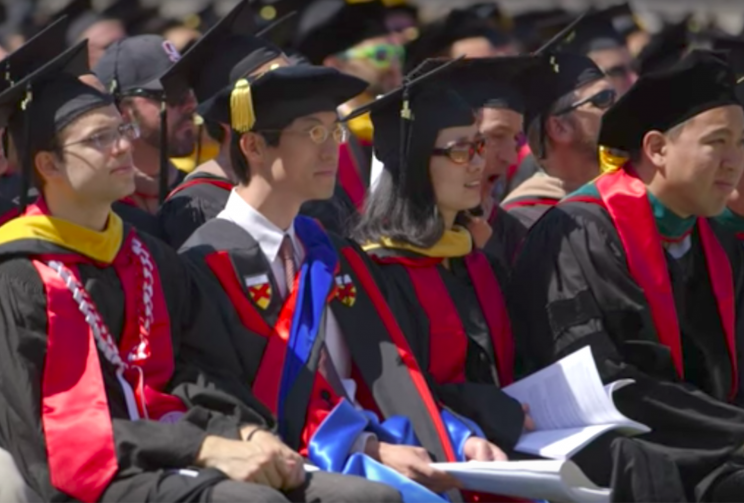How startups have infused ‘the vibe and the culture’ at Stanford

America’s most selective university is holding its graduation on Saturday, and many of its graduates likely have their pick of lucrative gigs at tech giants like Facebook (FB), Google (GOOG, GOOGL) and Microsoft (MSFT).
But some Stanford graduates may choose a potentially less lucrative and definitely riskier route.
“Startup is the buzz word,” says Benjamin Williams, a rising senior studying computer science at Stanford. “People talk about [starting] companies maybe even too much; it’s the vibe and the culture.”
While Stanford has a long history of producing entrepreneurs, current students Yahoo Finance spoke to suggest they might be more obsessed with startups than ever. Some of that might have to do with timing; Stanford graduates might be less risk-averse since the economy is thriving.
Moreover, millennials in general seem to have startup fever.
A survey of 18- to 34-year-olds from September found that 51% of 1,200 people surveyed knew someone who has launched or worked for a startup. And 78% of those who did know someone who worked or launched a startup considered that person to be a success. Meanwhile, 62% of the total millennials within the survey even considered a startup of their own.
Why startups?
“People talk about doing startups for the sake of doing startups,” says Lawrence Murata, a soon-to-be graduate at the School of Engineering. But Murata believes startups should evolve from the desire to “solve a bigger problem.”
Murata should know since he’s worked on a number of business ventures. For example, Murata and his friends were avid music listeners but didn’t enjoy their music listening experience — so they set out to create onetune.fm, a free music streaming service.

Though this project did not turn into a startup, Murata and friends continue to create projects that have gained attention like CS+Social Good. That project was launched to “connect students to use technology for taking action and collaborating on the world’s most pressing problems,” Murata wrote in a Medium post.
Now, already onto another project focused around communication between vehicles, Murata says his mission is to “create technology that will help reduce the number of driving-related deaths from 1.3 million deaths per a year to zero.”
Post-graduation, Murata intends to stay in Silicon Valley to work with a venture capital firm in order to accelerate this current project. He adds, “Being here helps because of your proximity to startups, to investors, and the tech innovation that is happening here.”
Stanford’s proud entrepreneurial history
Stanford students’ desire to join or create a startup of their own reflects a willingness to take a major risk. Unlike larger, more established companies, startups are more likely to fail, which could leave these graduates unemployed very early in their careers. While working at Google and Facebook may seem intriguing with incredible perks, the opportunities to strike it rich at these tech-leading companies are limited.
In the startup world, however, the high risk comes with the potential for high rewards. And Stanford grads know this.
For $62,541 a year, including tuition, room and board, and a mandatory health fee, these students have already made a wise investment in their four years of education at Stanford. It’s an investment that could be considered minuscule compared to the potential of earning billions.
Evan Spiegel and Bobby Murphy of Snapchat (SNAP) were once frat brothers of Stanford’s Kappa Sigma Chapter. Kevin Systrom of Instagram once roamed the halls of Stanford and made cappuccinos as an employee of Palo Alto’s Caffé del Doge, just a four-minute drive from campus, Steve Bertoni noted in Forbes. Facebook’s Mark Zuckerberg even asked Systrom to forgo his senior year at Stanford to launch a photo service for Facebook. Systrom later created it to become Instagram and ironically sold to Facebook for $1 billion.
Not everyone wants to be the next Mark Zuckerberg, Evan Spiegel, or Kevin Systrom
“Hearing something like Mark Zuckerberg’s story is somewhat amazing. He’s a 30-year-old CEO of a billion dollar company, but once you dive a little closer, it’s a huge anomaly,” says Morgan Bryant, a graduating senior. (Zuckerberg is 33 now.)
Others don’t feel the pressure to create a startup, either. Nathaniel Buescher, a graduating senior also, is set to work at Microsoft as a Project Manager. A project manager in Information Technology at Microsoft could make a starting salary of over $80,000, according to payscale.com.
However, he says that being surrounded by peers who are invested in what’s next for his generation is inspiring, adding that it’s an aspect of Silicon Valley that he’ll miss.

Silicon Valley’s powerful pull
Benjamin Williams — who’s interning as a software data engineer at The New York Times — feels an attraction to work in NYC post-graduation in May 2018. He also aspires to eventually develop his own company. Williams points out that tech engineers refer to New York as Silicon Alley, a nice, but still-growing tech scene.
And so, where does he think he has to go to create a successful startup? That depends on where the tech community is thriving when the time comes. But as of now, he thinks he’ll have to return to where the majority of investors and larger tech community live and work — Silicon Valley.
Brooke DiPalma is a reporter at Yahoo Finance. Follow her on Twitter @BrookeDiPalma
See also:
‘Very presidential’: Harvard students react to Mark Zuckerberg’s speech
Tim Cook challenges MIT grads: ‘How will you serve humanity?’